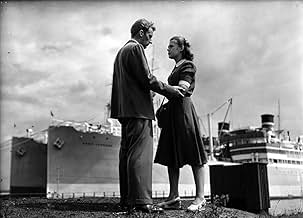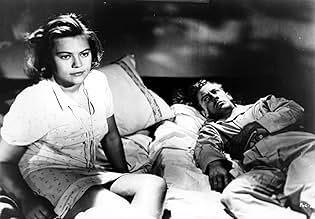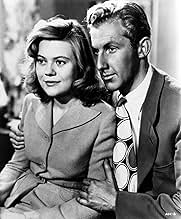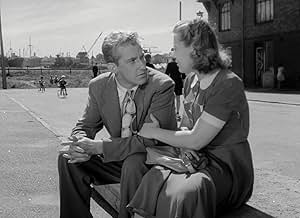CALIFICACIÓN DE IMDb
6.6/10
2.9 k
TU CALIFICACIÓN
Una obrera con tendencias suicidas, salida del reformatorio y ansiosa por huir de su dominante madre, se enamora de un marinero que no puede perdonar el pasado de la chica.Una obrera con tendencias suicidas, salida del reformatorio y ansiosa por huir de su dominante madre, se enamora de un marinero que no puede perdonar el pasado de la chica.Una obrera con tendencias suicidas, salida del reformatorio y ansiosa por huir de su dominante madre, se enamora de un marinero que no puede perdonar el pasado de la chica.
Edvard Danielsson
- Man
- (escenas eliminadas)
Carl Deurell
- Vicar
- (escenas eliminadas)
Kolbjörn Knudsen
- Sailor
- (escenas eliminadas)
Gunnar Nielsen
- Gentleman
- (escenas eliminadas)
Argumento
¿Sabías que…?
- TriviaThe book which Gösta reads on his bed is 'Resor utan mål' ('Journeys Without Destination') by Swedish author and future Nobel laureate in Literature (1974) Harry Martinson. Martinson was, indeed, a sailor before becoming an author, and the book, published in 1932 as Martinson's first prose volume (his greatest fame would come for his poetry), was a document of his own experiences as one, written at twenty-eight after he had given up the sea due to a combination of lack of employment and a bout of tuberculosis. A sailor like Gösta would indeed have found much interest in the book, as it dealt realistically with the life of a sailor from his country living a life very similar to his own. The book itself has sadly never been published in English, but Martinson's second novel, 'Kap Farväl!', somewhat similar to 'Resor utan mål', was translated as 'Cape Farewell'. Director Ingmar Bergman was indeed an admirer of his countryman Martinson and, in 1964, he staged the premiere of Martinson's play 'Tre knivar från Wei' ('Three Knives From Wei'), although, unfortunately, he considered the production an unmitigated disaster.
- ErroresWhen the camera pans from Gösta to Skåningen in the whistling scene, an object which is probably a microphone can be seen briefly in the upper right frame.
- Citas
Gertrud's Father: She never gave me any joy. Perhaps it's turned out for the best.
- ConexionesFeatures Stackars lilla Sven (1947)
- Bandas sonorasLa paloma
("A Dove")
Composed by Sebastian Iradier (1859)
Swedish text by Ernst Wallmark
Performed by Bengt Eklund
Opinión destacada
Berit is a factory girl fresh out of reformatory school and fresh from an attempted suicide by drowning when she meets a sailor named Gösta at a dance club. He beds her down that night, and later, when the two become lovers, allows himself to assume that he was the first man to do so. Meanwhile, Berit is desperate to be free: free from the badgering and manipulation of the mother she is forced to live with, free of the dirty work of the factory and free of her social worker and the constant threat of returning to reformatory school. Her already unhappy life is complicated when an old friend from the school desperately needs her help.
Personal freedom is a major theme of this lovely, bleak, but not pessimistic, early Ingmar Bergman movie. We yearn for Berit to find freedom from her unpleasant life, and most of all freedom from loneliness, just as we hope Gösta can free himself from jealousy and the specters of long-gone rivals for his affections.
Personal freedom is a major theme of this lovely, bleak, but not pessimistic, early Ingmar Bergman movie. We yearn for Berit to find freedom from her unpleasant life, and most of all freedom from loneliness, just as we hope Gösta can free himself from jealousy and the specters of long-gone rivals for his affections.
- J. Spurlin
- 4 sep 2009
- Enlace permanente
Selecciones populares
Inicia sesión para calificar y agrega a la lista de videos para obtener recomendaciones personalizadas
- How long is Port of Call?Con tecnología de Alexa
Detalles
- Tiempo de ejecución1 hora 40 minutos
- Color
- Mezcla de sonido
- Relación de aspecto
- 1.37 : 1
Contribuir a esta página
Sugiere una edición o agrega el contenido que falta

Principales brechas de datos
By what name was El puerto (1948) officially released in India in English?
Responda

































